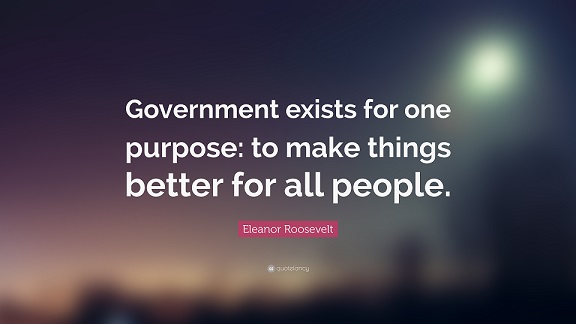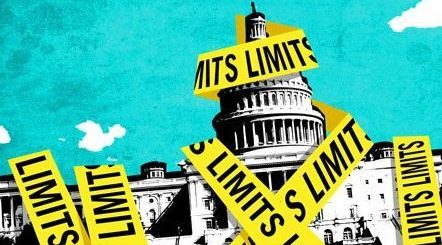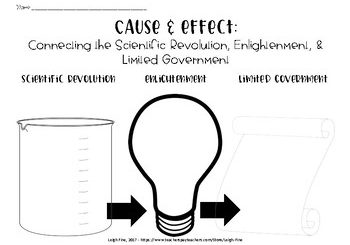Function and Purpose of Government

The means whereby governments achieve their objectives differ greatly from those of business. However, the objectives of profit or benefit are not. Each entity makes an investment intent upon a profitable return. A business obtains the results of success or failure through the revenues generated within the marketplace by the sale of an introduced product. If revenues exceed costs, it is appraised a success. If not, it is appraised a failure and, hopefully, the financial health of the company is not grievously impaired.
The profits secured by governments are not usually as directly or perceptibly accountable. They do exist and accumulate, but it is a complicated affair to properly and accurately account the benefits. Water treatment and distribution systems for the prevention of ills engendered by contaminated water, the benefits of a municipal transportation service, the preservation of forests, the maintenance of highways, and the establishment of health services to those in need: all provide acknowledged returns to the state. But an estimable and precise method of reckoning these returns has eluded the authorities, probably because within a system of Taxation they have never had to attempt it. I do not believe applying accounting principles and practices to government shall be prodigally expensive and far from feasible. But adjustments and accommodation may take some time and effort. When the foundations of a proper accounting have been laid and seasoned, it shall be as easy and precise an affair to estimate, project, and account the undertakings and ventures by government as it is for business and the individual.
It is a difficult affair to adequately describe the nature and functions of government in all aspects. My conception of government and its relation to the public within its jurisdiction appears as a super-corporation that functions very much like a titanic investment bank. I am careful in this description as a number of persons mistake the elucidation for a nation imbued with and oriented toward Socialism. This inference is wholly baseless.
Government operates as an investment engine. It makes a multitude of investments to benefit its owners, the shareholders, the citizenry residing within its sovereign domain. Each citizen or shareholder has claim to or possesses a certain variable amount of the assets and wealth of the land. The totality of these assets, all combined, comprise the assets of the super-corporation.
The government, an institution obtaining its existence and powers from the original populace and reinforced by posterity, is the managing body. The citizens of the corporation elect their representatives in a manner similar to, but with variation from, the manner in which all public companies select their directors. Among them, directors are appointed to administer the apparatus of government, its resources, devolved powers, and employees, to enhance the existing assets of the shareholders or create new assets. Each investment should yield profits surmounting all costs.
This is neither Socialism nor Communism. Drawing upon the example of the United States, we discern a collective of individuals of diverse means, beliefs, abilities and capabilities united in one corporation, and a corporation to which the people, the citizenry, have provided sanction. In various US government charters the venerable phrases, “We, the people”, and, “The People of the United States of America”, occur repeatedly. Governments derive their powers from the people and the supreme mandate is to ensure the liberties of and furnish benefit to the citizens, their shareholders, dwelling within a nation’s borders.
To support my claim that government is an investment bank, the example of a people plagued and crippled by war or settling in virgin territory shall be useful. If a nation stood defeated in war, the majority of its moveable assets plundered, its fixed assets obliterated, and its currency and economy worthless, a sanctioned or provisional governing body still possesses the means to invest and create assets for its citizens. The assets of such an institution would consist in the intellectual and physical abilities of the inhabitants, present and future, and the tracts of land comprising the jurisdiction, though devastated and encumbered but still possessing value, however diminished. The Government could conceivably offer certified currency to those labouring on behalf of the people, perhaps in an effort to clear streets congested with rubble, an asset for those engaged in transport. Armed with this remunerative paper, the labourers would purchase wares from retailers, putting money into circulation. The government could continue to pay with currency until inflation entered the fray. Then the government could borrow from the public to finance expenditures for a myriad of essential projects. Even a people grappling and suffering in lamentable circumstances has the means to raise itself from a debilitating to a prosperous state through such investments. Similarly with pioneers settling in untouched lands. The settlers could establish a government to offer currency and, thence, debt instruments for the construction of public projects of great benefit. The past, however fruitful or barren, has little consequence upon the needs of the future.
The ultimate and primary undertaking of government is to invest for the future. When the situation demand, this representative body must legislate, regulate, spend, and govern for the benefit of its citizens. It must create and maintain a legal system to punish the criminal, an education system to prepare the youth and idle for the fundamental demands of the labour market, a health system to maintain or enhance the productive contribution of an individual, a system of law enforcement to preserve property and protect the citizen from the criminal, a pension system to aid the individual in retirement, a military complex to protect the nation, and numerous other services. And the government must ensure that these services are adequate for the assigned tasks. And each service compels the expenditure of capital, initially and perpetually.
Education is prime example of government investment. The education of our children and youth is an expensive, but doubtless indispensable undertaking. Enormous amounts of capital are allotted to this endeavour. How does the state secure its returns? Simply, the revenues come many years thence in elevated income tax revenues issuing from the elevated wages knowledge garners.
In a nation that maintains impressive standards of education, industries that require employees possessing meagre skills shall gradually wane whilst those demanding employees possessing extensive abilities shall thrive. The apparel industry is one such example. Indeed, any corporation that relies too heavily upon unskilled or marginally skilled labour in the production process shall inevitably transfer manufacturing to countries with commensurate educational standards, that is the third world, or cease to operate.
Not every pupil upon whom money has been expended shall yield sufficient returns. However, the majority shall succeed, and surpass any shortfalls. If a nation possessing a high living standard were, in order to conserve capital, to refrain from supporting a national system of education, the country would quickly descend the scale and eventually rest with those who view education as a preserve of the privileged. The world affords many examples of nations who stolidly neglect the education of their people, none of which rank with those who do not.
The government must expend enormous amounts of money upon a series of investments for each individual and for the abiding collective. This population shall over time expand. Thus, ever larger expenditures of capital shall be needed. The nation shall perpetually require more roads, schools, and hospitals. The expenditures of today shall dwarf those of yesterday, and those of tomorrow those of today.



